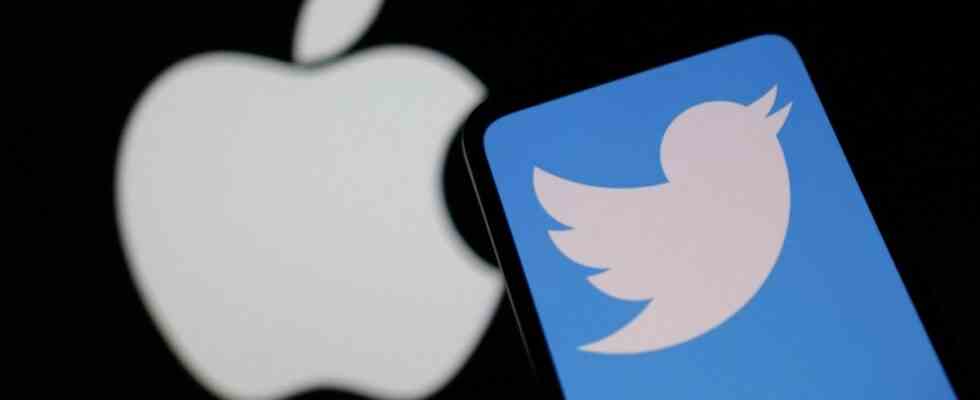Elon Musk may be the richest man in the world, but as head of the social network Twitter, he lives dependent on someone else: Tim Cook, CEO of Apple, master of one of the two central app stores in the world. That explains Musk’s tweet on Monday: “Apple has threatened to ban Twitter from its App Store, but won’t tell us why.”
Apple decides which apps users can download from the App Store. According to Musk, Apple signaled him behind the scenes that Twitter could be kicked out of the store. Then Twitter would no longer be available on 1.5 billion cell phones.
The background could be the consequences of Musk’s mass layoffs on Twitter. The company has also lost those people who delete problematic content. So-called content moderators should intervene when users publish racist posts, threats or lies that are harmful to health. Twitter has journalists who are well connected in the company According to Casey Newton recently unlocked 62,000 major accounts that were banned, many believed to be for hate speech. Alex Stamos, Stanford professor and former Facebook security chief, compared him with a scene from the Batman comics where the Joker frees all the dangerous psychopaths from the psychiatric ward. Under Musk, debates on Twitter have become wilder, as initial analyzes indicate.
Two weeks ago, Tim Cook had to twitter said: “I don’t think anyone wants hate speech on their platform, so I’m counting on them continuing to do something about it.” That must have sounded like a threat to Musk. If an app violates the company’s guidelines on so-called hate speech from Apple’s point of view, the company can throw it out of the App Store. He already did that with the Parler app operated by right-wing extremists.
Apple ads are said to have accounted for four percent of Twitter’s advertising budget
Musk is obviously acting out of self-interest and anger that Apple doesn’t think the new Twitter is a clean advertising environment. Apple ads made the Washington Post according to most recently four percent of Twitter’s advertising budget. Several of Musk’s most recent posts were little more than propaganda from an offended person: “Apple has stopped posting ads on Twitter. Do you hate freedom of speech in America?”
And yet he points to a problem in the digital sphere that receives comparatively little attention. Apple, the company with the best image among tech companies, has developed a power that has become uncanny for many. Together with Google’s Play Store, Apple forms a duopoly in the platforms for apps. Without the two companies, apps have no chance of making it onto a serious number of cell phones.
The “Techlash”, the anger of citizens and politicians at the tech companies because of their surveillance technology and manipulative algorithms, hit Facebook, Microsoft and Amazon. Apple was often spared. The group maintains its image as an ethical global brand: Apple does not resell user data, defends customers against investigators’ surveillance fantasies, and develops technology to protect civil rights activists from espionage. In China, however, it is evident that Apple also makes compromises with dictatorships: iPhones in China automatically censor unwanted content, the data backups of Chinese users are not well protected from state access. The Chinese market is too important.
In 2021, Apple allegedly once again sided with the users when Cook put another company in its place: Apple’s new rules called ATT disabled apps with intrusive advertising monitoring technology in the store. The ad system of Facebook and Instagram is based on such technology – it was a heavy blow to the meta corporation. And it was a show of force from Apple. Even those who hate Facebook’s advertising monitoring machine have to admit: Apple showed that the company can shoot up other companies’ business models at the touch of a button. Just as Musk now fears.
He was now tweeting, Apple charges a “secret 30 percent tax” on every purchase in the App Store. In fact, app developers have been complaining about this fee for a long time, feeling fleeced by Apple. It also applies to the Twitter Blue premium membership, which users in multiple countries can purchase for $7.99.
On the one hand, Musk is powerless when it comes to the App Store. If Apple comes to the conclusion that Twitter has degenerated into a cesspool, then the company can fill up this pit. Musk may be speculating that Apple has just as little interest in banning Twitter as he does. Because if Apple acts, Musk, his right-wing allies, but also users and politicians who see Apple critically, could spark a campaign against the group, which could permanently damage its image. Republican senators are likely to steer antitrust investigations more towards Apple.
Since neither side should be interested in Twitter being removed from the App Store, there should be an agreement: Musk will take care of the moderation a little more, Twitter can stay and he can be celebrated as a resister against Apple. Then he could also give himself another idea, which he recently thought aloud about to put pressure on Apple and Google: to build his own smartphone with his own app store. That would be significantly more expensive than hiring a few content moderators.

